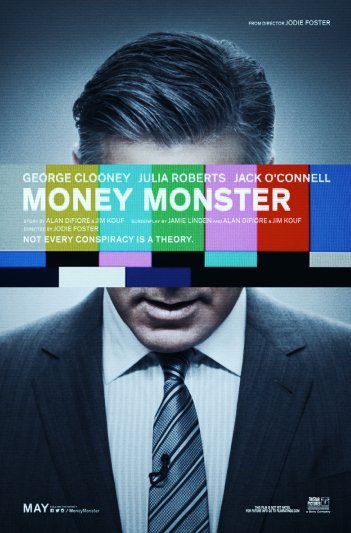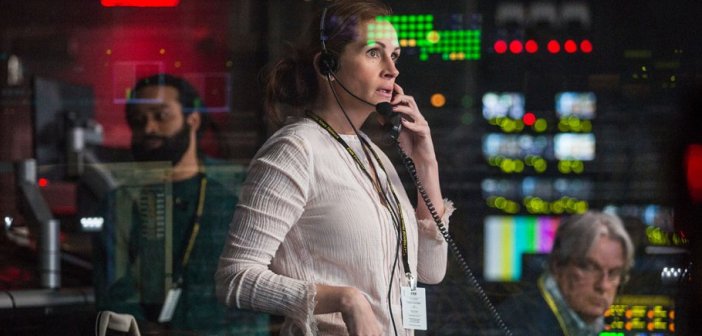Film Review | Money Monster Channels Classics Like Dog Day Afternoon and Network with Claustrophobic Hostage Drama
Lee Gates is the pompous and arrogant host of a brash TV show called Money Monster, advising his audience on which stock market opportunities to invest their money in. When one of his “sure thing” calls turns bad and collapses, Lee finds his life turned upside down. Kyle Budwell, a deliveryman who lost everything on Lee’s bad investment advice takes him hostage live on air and he wants answers.

I love it when a film leaves its credits until the end. I don’t necessarily need to know who does what before a film starts; it sometimes works as more of a distraction unless the credits themselves serve some kind of artistic purpose. Alfred Hitchcock and David Fincher really perfected the opening credit sequence, but this isn’t a conversation about credits. I mention it only as the greatest surprise of this film is delivered as the credits roll, that surprise being that Jodie Foster directed it. Foster, one of the greatest actresses of her generation has stepped away from acting in the last ten years or so, her last major film being Elysium in 2013, but with Taxi Driver, The Accused and Silence of the Lambs on her CV there is very little this woman needs to prove. But if the price of losing her as an actress is the gaining of her as a director then I think it is one I would gladly pay, as Money Monster is a really well crafted and confident film. Foster may not be an accomplished director in terms of volume of work, she has 8 directorial credits to her name, only 4 of which are feature films. The Beaver with Mel Gibson from 2011 was her most high profile feature film to date and unfortunately any impact it could have made was scuppered by Gibson’s sudden and rapid fall from grace in 2010. Money Monster is certainly going to correct the record and hopefully open up a raft of possible projects to Jodie Foster the director as opposed to Jodie Foster the actress. Money Monster really is up there with Ben Affleck’s turn behind the camera on Gone Baby Gone or Robert Redford’s Ordinary People.
Working like a combination of Dog Day Afternoon and Network, Money Monster successfully mixes humour and tension. You will laugh during this film, but you’ll also grip your armrest too, as this is a hostage thriller first and foremost. The best moments of the film are those between stars George Clooney, Julia Roberts and Jack O’Connell in the claustrophobic television studio. Foster neatly builds the tension, adding layer upon layer to all three of her central characters. Clooney is not your average television presenter, Roberts is jumping ship to a rival studio and O’Connell isn’t just a nut with a gun. And this is where she adds a deft stroke, she gives the characters room to breathe, she builds and invests in them and coaxes Roberts’ best performance since her Oscar winning turn in Erin Brockovich 16 years ago. While saying that this is a hostage thriller, it also finds the time and the voice to comment on modern society, on greed, on social media and how the pursuit of profit and the pressure of money, both struggling to attain it and struggling to keep it, taints society. This is beautifully realised in the opening minutes as Gates, with a gun to his head and bomb vest on his chest, asks Kyle how much money he lost following his bad advice. On hearing the figure he immediately offers to give him that figure back, much to Kyle’s incredulity, highlighting that these are two people living on either side of a cultural and economic divide, one has plenty and the other not enough. But Kyle is not looking for money and this is what sets his character apart, he isn’t holding Gates hostage for a Kings ransom and a plane to the Bahamas, he just wants answers and honesty.
As the film progresses the characters evolve and change and you find a very definite arc for each of them and this allows you to care for them. And that is the key. While highlighting Roberts turn as the TV director, Clooney’s natural charisma really makes his brash take on Gates quite palatable. He makes you raise an eyebrow in disdain but also admire his confidence and no nonsense attitude. He is wholly self-centred but he is also the central character and our best example of someone to root for. His journey is tied in with that of O’Connell’s Kyle Budwell and where Kyle knows exactly what he is doing, Gates does not and the natural tension from Gates trying to read and alter the situation in his own favour draws the viewer in. The most interesting part of this interaction between Gates and Kyle is in the final act as the roles start to reverse. Yet Gates would not be half as intriguing without a foil as strong as O’Connell. He really channels the angry everyman into his take on Kyle Budwell and there are definite shades of Howard Beale from Network. You can almost imagine him shouting down the barrel of the lens “I’m as mad as hell and I’m not going to take it anymore.” But Kyle isn’t a nut, he isn’t losing his grip on reality, he’s just a working joe that jumped for the American Dream and landed on his ass.

While saying that this is a confident and engaging film it is also not perfect. The supporting characters, that of Diane Lester (portrayed by our own Catriona Balfe) and Walt Camby are not so well defined and the police presence seems quite pedestrian and one-dimensional. It’s as if Foster focused her energy into her three leading characters and left nothing in the tank for her supporting cast. This isn’t really a glaring error on her part though, with three central characters as well defined as Clooney, Roberts and O’Connell then she should be forgiven for not giving the police more to do than wave rifles and growl into walkie talkies. And while the film never runs out of steam, there is a definite and not necessarily positive tonal shift in the final act. As the studio setting begins to run a little dry, the film side steps into All the Presidents Men territory and while it doesn’t feel like the next natural step for the plot, Foster handles it very well.
Money Monster deserves a wide audience, it deserves to be seen and enjoyed as enjoyable it most certainly is. While commenting on the divisions and deficiencies in modern society it also serves, in my mind anyway, as a neat little blast at the alarming place that Hollywood and popular cinema in general seems to be going. The pursuit of quick, easy money can be seen in the modern multiplex’s audiences addiction to quick, vacuous thrills; films with zero substance boasting a nice shiny gloss that cons the film-goer into thinking that this film must be seen, I have to consume this film, to shell out my hard earned and get nothing back in return. I can find no other way of explaining Batman v Superman’s near billion dollar haul at the box office, the relentless churning out of Marvel films or the onward progress of the X-Men series into a abyss of ever diminishing returns. But this is not a rant on the state and future of popular cinema; this is about recognising Money Monster, a surprising and engaging film. Like The Big Short from the start of the year, Money Monster is a film with both a message and a heart. It won’t change your life but it will ask questions of you and for me that is exactly what a film should do.
Money Monster is in cinemas now. Check out the trailer below.
[youtube id=”qr_nGAbFkmk” align=”center” autoplay=”no” maxwidth=”750"]
Featured Image Credit

